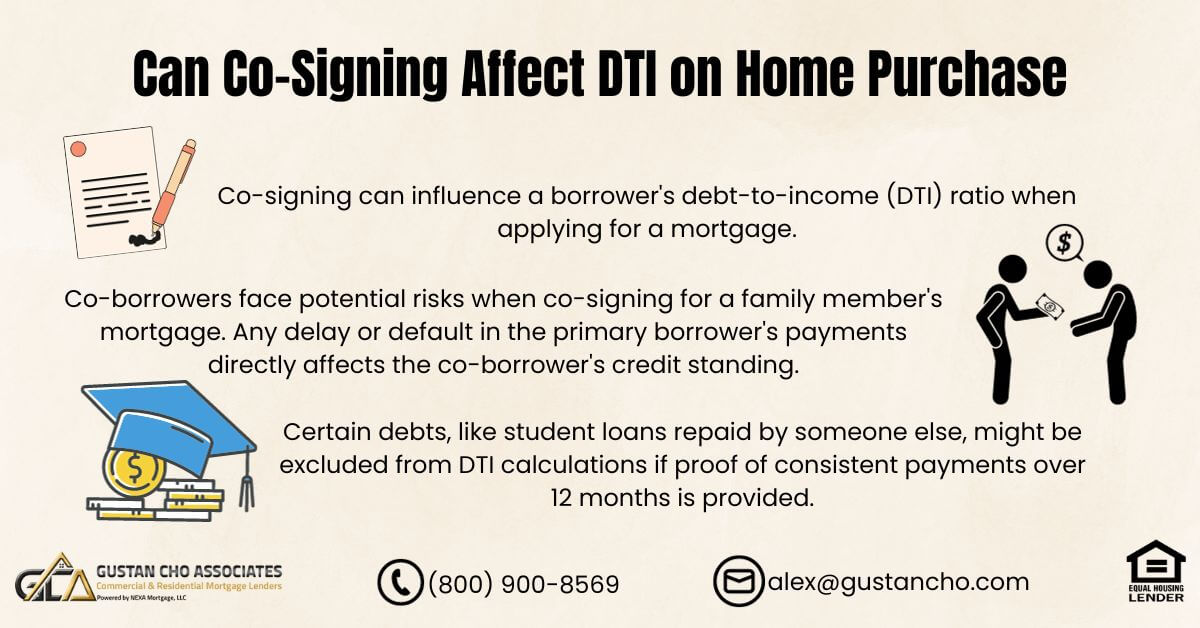Can Co-Signing Affect DTI on Home Purchase
In this article, we will cover the topic of whether can co-signing affect DTI on home purchase. There are instances non-occupant co-borrowers love to co-sign for a family member’s home purchase but are afraid it may affect their home purchase down the road. It is often difficult to say no when a family member asks a loved one if they can co-sign for them. Many do not want to ask a family member to co-sign for them.
The co-borrower frequently faces pressure in this situation. Non-occupant co-borrowers might be reluctant to co-sign but still wish to support their family member. By becoming a non-occupant co-borrower, they willingly take on a risk. Any delays in the main borrower’s monthly mortgage payments will directly impact them, potentially harming their credit standing.
Missing a mortgage payment can significantly impact your credit report. However, if the primary borrower manages to refinance within six months, the risk only extends to that timeframe. Should the primary borrower fail to refinance and leaves the non-occupant co-borrower on the mortgage for a full year, the co-borrower can then be absolved of the debt by creditors. Additionally, after 12 months, if the primary borrower furnishes a year’s worth of canceled checks, the co-borrower’s liability in debt-to-income ratio calculations will be alleviated. In the upcoming sections, we’ll delve into how co-signing can influence DTI in the context of home purchases.
Does Co-signing Affect Getting a House?
One of the frequently asked questions at Gustan Cho Associates by our viewers and borrowers are does co-signing affect buying a house.
At times, family ties are strained due to one member declining to co-sign, resulting in a lost relationship. Similarly, situations arise where family members initially agree to be non-occupant co-borrowers but retract their commitment at the eleventh hour. In the upcoming paragraphs, we’ll explore the impact of co-signing on the Debt-to-Income (DTI) ratio for non-occupant co-borrowers when they aim to buy their own home in the future.
Despite being involved in the mortgage industry, he felt anxious about applying for a mortgage due to being a co-borrower on his former spouse’s home. His uncertainty stemmed from conflicting information when he researched whether co-signing could impact the debt-to-income ratio (DTI) for a home purchase. Eventually, after a thorough investigation, he found clarity on this matter from Angie Torres, who explained the potential impact of co-signing on DTI for a home purchase.
Get A House By Qualify For Loan, Click Here
How Can Co-Signing Affect DTI on Home Purchase
Being a co-signer can impact a mortgage applicant’s eligibility for a loan. This happens because the monthly minimum payments are factored into assessing the debt-to-income ratios of the applicant. So, yes, being a co-signer does affect the debt-to-income ratios for a mortgage. Nevertheless, a non-occupant co-borrower becomes eligible for their mortgage after 12 months. To qualify, non-occupant co-borrowers must furnish their lender with evidence that another person is making payments on the co-signed loan. Primary borrowers need to provide 12 months’ worth of canceled checks or bank statements to fulfill this requirement.
Can Co-Signing Affect DTI on Home Purchase Buying Power
Co-signing can indeed impact the Debt-to-Income (DTI) ratio when purchasing a home, but the extent varies. For co-borrowers eyeing their home purchase within a year, it does have an impact. In response to the common query about whether co-signing affects DTI in home buying, the answer is both YES and NO. The effect remains for one year. Nevertheless, once the primary borrower completes twelve on-time mortgage payments and can furnish evidence of this with a year’s worth of canceled checks, the impact on the co-borrower diminishes. If the co-borrower plans to apply for a mortgage, it will no longer adversely affect their application.
It will not affect non-occupant co-borrowers from purchasing a home if they can provide the main borrower has paid their mortgage payments for the past 12 months. The proof is provided by providing the lender with 12 months of cancelled checks or bank statements.
When securing a home loan, the debt-to-income ratio is a key factor assessed by a mortgage underwriter. It’s calculated by adding up all the minimum monthly payments made by borrowers and dividing that total by the borrower’s gross monthly income. This calculation yields the debt-to-income ratio, a crucial metric in the loan qualification process.
Can Co-Signing Affect DTI On Home Purchase and How Do Underwriters Calculate Debt-To-Income Ratios
Let’s take a simple case study on how a mortgage underwriter calculates debt-to-income ratios. Monthly minimum payments for borrower A are the following:
- $50.00 per month for Capital One credit card
- $50.00 per month for student loan payment
- $300.00 per month for Auto Loan
- $200.00 per month for child support payments.
Borrower’s proposed new housing payment includes:
- principal
- interest
- taxes
- insurance
- homeowners association, if any
- flood insurance, if any
- The above is added to the sum of the total minimum monthly expenses
Let’s assume that the principal, interest, taxes, and insurance are $1,000 for this case scenario. Talk To Our Loan Officers For Home Purchase, Click Here
Case Scenario
Let’s assume a monthly gross income of $3,000.00. The back-end debt-to-income ratio for Borrower A is the sum of all monthly payments, including the housing payment, which is $1,600.00 divided by Borrower A’s monthly gross income of $3,000.00, which yields 53%. The front-end debt-to-income ratio is calculated by dividing just the proposed housing payment, PITI, by the gross monthly income. In this case, it is $1,000.00 divided by the borrower’s $3,000.00 gross monthly income, which yields 33%.
Solutions To Co-Signer Affect Debt-To-Income Ratios
If you’ve co-signed for someone but aren’t liable for the housing debt, the monthly payments might not factor into your debt-to-income ratios. This exemption applies if you, as the co-signer, can furnish evidence of 12 months’ worth of canceled checks or bank statements from the primary borrower responsible for making these payments. Here’s a case scenario illustrating when a co-signer won’t be held accountable when purchasing a home:
For example, here is a case scenario, if a cosigner has co-signed for children on an auto loan, the child is responsible for making the payments. The co-signer can request 12 months of cancelled checks or 12 months of bank statements reflecting child is making the payments and the cosigner is not.
Under these circumstances, when a cosigner acts as a non-occupant co-borrower on a mortgage, the mortgage payments won’t be factored into the debt-to-income ratios. This exclusion applies if the primary borrower can demonstrate that they’ve been consistently making these payments. To establish proof, the primary borrower can submit either 12 months of canceled checks or 12 months of bank statements illustrating their payment history.
Debts That Someone Else Is Making
If individuals carry debts in their name but aren’t accountable for the monthly payments, with another person covering these payments, the debt might be excluded from the debt-to-income computations. This exemption from DTI calculations applies when they can furnish a 12-month record of canceled checks from the responsible party handling the payments.
A prime illustration of this case involves student loans taken out in the student’s name but being repaid by the parents. Furnishing 12 months’ worth of canceled checks from the parents can result in a reduction of the monthly student loan payments when assessing the borrower’s debt-to-income ratio.
The same goes for car loans or other installment debts, except for credit card and revolving debt. For more information about this article or other mortgage-related topics, please contact us at Gustan Cho Associates at 800-900-8569 or text us for a faster response. Or email us at gcho@gustancho.com.







